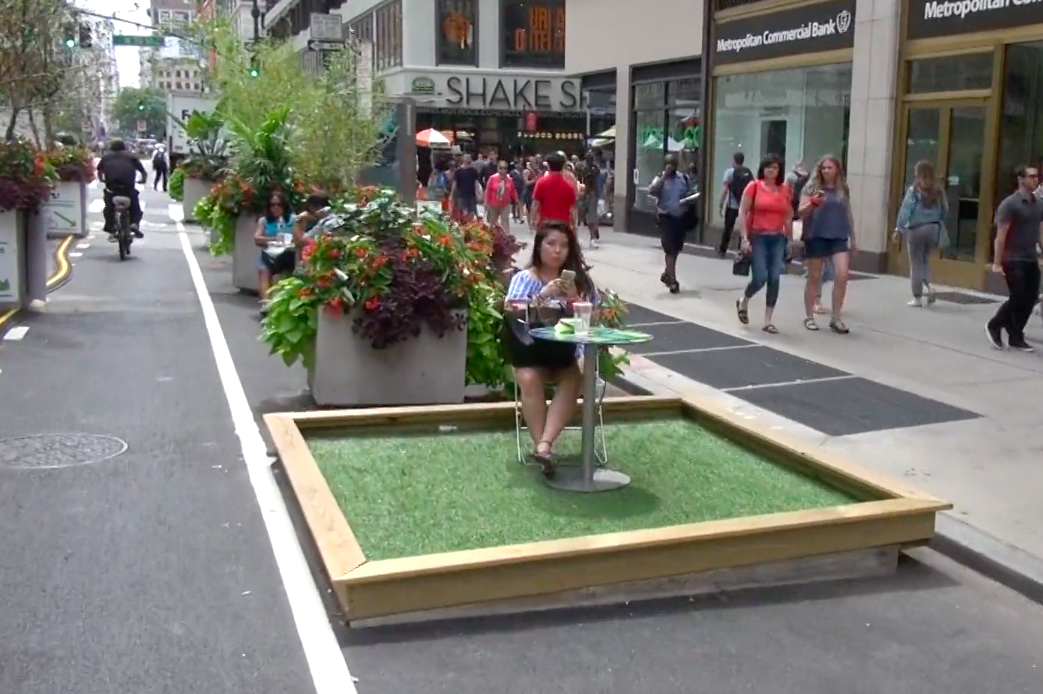
In a bid to help its businesses survive the coronavirus pandemic, the city is allowing its bars and eateries to cordon off sidewalks and curbside spaces for outdoor dining — a push made even more urgent by the further postponement of indoor dining over fears of virus spread.
Restaurants have responded avidly: In just two weeks, more than 6,700 establishments have gotten sidewalk- or street-seating permits under the Open Restaurant program, taking over the space with planters, ropes, plastic barriers, and decking. The streets where outdoor dining has popped up are, so the program's proponents say, quieter, cleaner, safer, and way cuter than when they were packed with cars. Many New York City streets, once traffic sewers, now look downright charming. And the city announced a further expansion on Thursday: the roadways of 22 streets will be opened for dining, too.
But as the city dives headfirst into cafe culture, we must consider the effects of privatizing public space. We need to ask the question on one is raising as we push through the restaurant-help initiative: in a dense city with inequality written into its infrastructure, could this plan actually diminish the power of the public, especially the unhoused, the poor, the disabled, children and the elderly, and people of color?
When a space is privatized by a business, it becomes, by definition, transactional. Transactional spaces — those with clear-cut rules of engagement — exist in order to attract the “right” kinds of people. They do that by constricting the movement of those deemed undesirable and prioritizing orderliness to serve their intended purpose: making the owners money.
A particularly insidious private entity is the business improvement district. The city has given these not-for-profits space under the pretenses of public safety and job creation, but they are notorious for exacerbating homelessness and inequality by "enacting, maintaining, and strengthening laws that criminalize activity like sitting, resting, sleeping, panhandling, and food sharing in public spaces," as University of California researchers concluded in their study on BIDs' effects on California's cities.
The possibility of conflicts abounds. A number of conflicts between businesses and the public (and even other businesses) have arisen out of Open Restaurants:
- In Queens, the site of a father playing catch with his son near his street seating made a restaurant owner "explode" with rage.
- In Manhattan, a halal vendor is still fighting with a hotel chain over a sliver of space the vendor used for years, now taken by the hotel's restaurant.
- All over the city, bike lanes are being overrun with street seating.
Came home from the big bike ride in Manhattan tonight and rode down 2nd avenue and the restaurants have seating on both sides of the bike path, and so there are signs telling the bike riders to ride slow because the bike path is technically inside the restaurant.
— Denise K., Xennial (@dennerdenner) June 28, 2020
There is even the possibility for conflict between restaurant owners/goers and people participating in forms of civic expression, like the one seen in the following video of white curbside drinkers in Brooklyn looking deeply uncomfortable as a passing "March for Black Womxn" calls them gentrifiers.
The establishment (and patrons) in the video apparently did not respond in any way. But can we trust that owners will never resort to state authority — for example, calling the police — to ensure that paying customers can eat and drink in peace? In conflicts, businesses can and will prioritize their needs over the needs of anyone outside of themselves and their customer base — because that's what businesses do.
All this isn't to say we can't ever enjoy outdoor dining (or that we should give street space back to cars). But as we do so, we need to make sure that our streets are more pleasant, accommodating, and power-building to members of the public whose needs aren't met through endless brunch.
The city should encourage people to imagine and experiment with their own visions for streets. The coronavirus emergency has led us to embrace innovative solutions, such as the Open Streets program that is creating 100 miles of shared streets for residents. Why not make curbside parking freely available for other uses, as the safe-streets movement has advocated for years?
We also should re-examine the arrangements that make our streets so unwelcoming. The city has ceded too much power and authority to the BIDs; at a minimum, it should set clearer rules, with an eye toward phasing out those arrangements. The city and the state can, and should, strike broken-windows laws against loitering, jaywalking, sleeping outside, and public drinking, because these edicts only punish people for unsanctioned uses of space, and are enforced in ways that discriminate against people of color. [Shabazz Stuart wrote forcefully about that last week in these pages.]
The city can augment the public's power and dignity through making amenities available for working, playing, eating, even sleeping — such as tables and chairs, flat benches, toilets, showers, parklets, sanitation bins, and spaces not made for anything in particular. Even public tables and chairs would allow people to enjoy outdoor eating without keeping out people who can't afford to — or just don't want to — spend money at a business.
When the full public can use and shape its streets without being under the auspices of private interests, the possibilities of reimagined public spaces are endless.
The city’s Open Restaurants program will last through Labor Day (and maybe longer). People whose needs these restaurants serve indoors or out, who are otherwise not lacking in private space, safety, or services, are clamoring to make the arrangement permanent. But, as the city takes this space for the purpose of supporting businesses, we should consider: When we create cities for the least of us, we give all of us the space we need to thrive.
Nicole A. Murray (@nicoleamurray) is a member of the Ecosocialist Working Group of NYC-Democratic Socialists of America.






